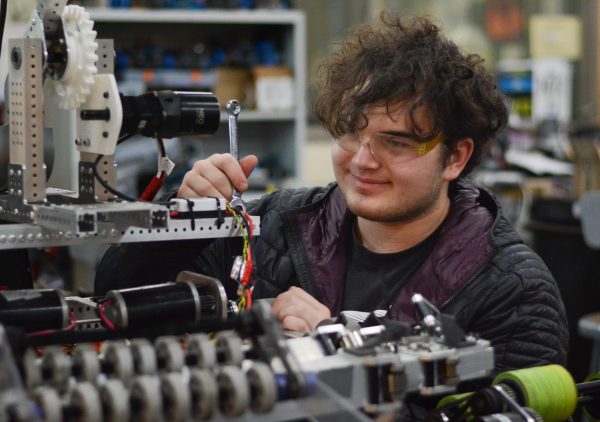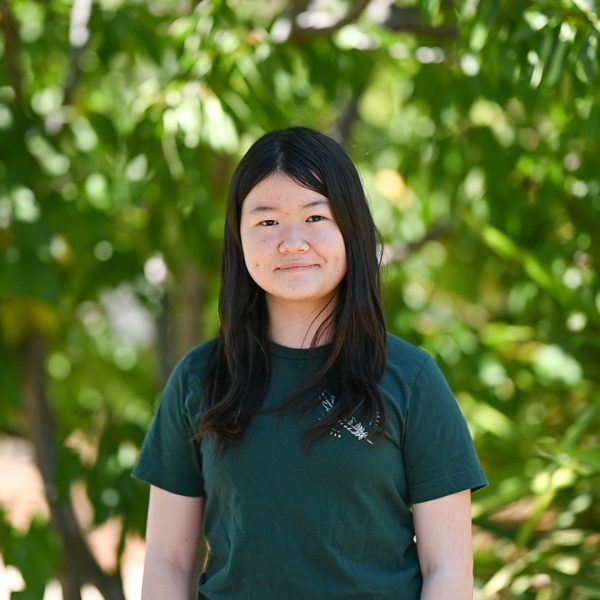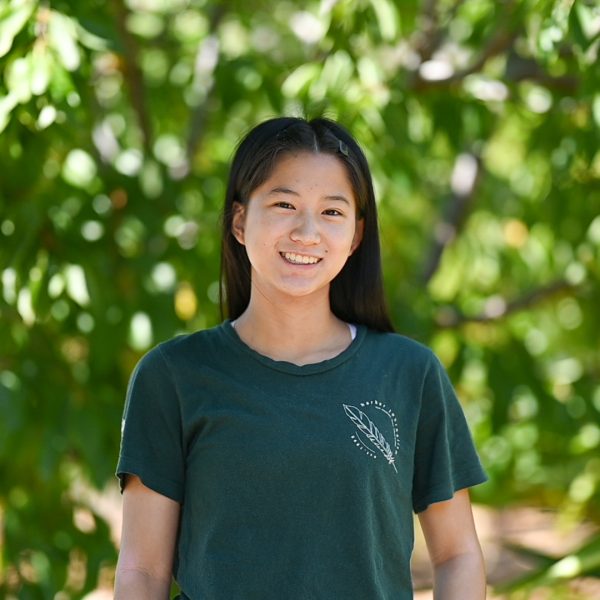
Spending countless hours each week in the robotics lab is no easy feat. Between assembling intricate components, debugging code and troubleshooting technical issues, robotics demands patience and persistence. Yet, this challenge is what first attracted senior Stefan Maxim to the club at the start of high school and what continues to make it rewarding for him.
“Robotics is very multidisciplinary; you have to use a lot of different skills,” Stefan said. “You have to know physics, you have to know computer science, you have to know mechanics and electronics. It’s a very complex thing, a robot. You have to know which to use and when; that was probably the biggest challenge because I didn’t really have that much experience in mechanical things.”
Stefan’s ability to integrate diverse skills has allowed him to explore various activities. Originally a debater in middle school, Stefan found little thrill in the pre-written and rehearsed scripts. Upon entering high school, Stefan searched for a more thought-provoking activity that would give him the freedom to search for solutions himself. He stumbled upon DECA and is now an avid competitor in FOR, which gives him the opportunity to conduct financial research.
“DECA certainly shaped me for the better,” Stefan said. “You have to learn how to communicate your opinions clearly, how to convince someone who originally doesn’t agree with you to agree with you. For most scientific research, it’s fairly objective. But in finance and social sciences, it’s not really that clear; you can make a fair argument for a lot of different styles of philosophy. What I learned to do is how you weigh those different things.”
Stefan’s commitment to DECA allowed him to learn more about finance and its importance in his community, as well as a process to go about his research. In his work for DECA, Stefan began with a broad question about how the financial analysis of JP Morgan Chase was affected by labor leveraging and labor specialization, before digging deeper and discovering underlying economic concepts from the human resources department in companies. In his work, Stefan emphasizes approaching economics from a big-picture perspective instead of solely focusing on technical details. Through his research papers and work in DECA, Stefan aspires to provide more accessible information to his community about the ever-changing economic state of the world.
“Everything is really a financial system, at least in capitalism and the way that our society works,” Stefan said. “Analyzing the study of transactions and how this could be optimized with tech can have an impact on pretty much everything. I hope that through my work I could make the systems a little more effective, decrease bias of different people and help people understand the current geopolitical state of the world right now.”
Outside of financial research, Stefan’s interest in global politics led him to explore more deeply into and write about the world of international trade and technology. Researching a variety of online resources and YouTube videos, Stefan wrote an article on semiconductors’ impact on global trade as a member of Harker’s economics magazine Oeconomia and has developed an interest in the interplay between local innovation and worldwide influence since.
“This being Silicon Valley, it’s pretty hard not to hear a lot about tech,” Stefan said. “Most of our parents and friends work in these kinds of fields. I find that really interesting because global trade does have a lot of implications on us and how we interact with the world, everything from how we get our electronics to other devices.”
From his experiences in research, Stefan has learned to be more critical towards the sources that he comes across. He finds that the skill to discern scholarly sources is essential to a world influenced by conflicting narratives.
“The biggest challenge of research would obviously be misinformation,” Stefan said. “There’s always different sources who try to spin their own things, especially when it comes to something as heated as global trade and politics. The challenge is trying to pick out between the pieces, and see what’s true, what’s not true? What’s an exaggeration? What is a half truth?”
Stefan’s curiosity extends beyond his personal endeavors. Within the classroom, Stefan’s Honors Calculus C teacher Anu Aiyer notices his eagerness in applying course material to real-world problems.
“He shows his curiosity by asking questions and trying to use the things we learned in class on things he was working on outside of class,” Dr. Aiyer said. “He tries to look at practical applications of things, especially when we were looking at the multivariable second-semester material.”
Close friend senior Aaron Chen commends Stefan’s hardworking character that shines through especially in robotics. As the design director, Aaron has consistently been a witness to Stefan’s unwavering determination to constantly improve and learn.
“When I first met him, he was just cracking jokes during lunch,” Aaron said. “But over the years I’ve known his more dedicated side, especially through robotics. I was teaching him design over the off season of robotics, and on season he was spending 10 to 20 hours on the weekends helping. He taught me the extent that you can take dedication and to always be ready to learn.”
Outside of extracurriculars, Stefan’s humor extends to his interactions in daily life. Close friend senior Eric Li, who has known Stefan since frosh year, praises his confidence and humor that brings a unique energy to their social circle.
“He’s a funny guy,” Eric said. “He’s not afraid to speak his mind. So, I’ve been trying to emulate that type of confidence in my own life. We usually hang out after school or during lunch. The environment is light hearted, there’s always jokes going around.”
For Stefan, learning isn’t just a personal endeavor, but also about asking questions and questioning the reliability of online resources at face value. Reflecting on his research journey, Stefan aspires for his work to encourage those around him to participate in critical discussions about the world.
“I hope everyone could learn a little bit, since I’m learning,” Stefan said. “As global citizens, we all have the right to vote and we all should be educated on at least how the economy works and how optimizations can be made through tech. I hope in the future when things become even more polarized, that people will still be able to question each other and have candid discourse and always be willing to learn and question what they know.”


















![“[Building nerf blasters] became this outlet of creativity for me that hasn't been matched by anything else. The process [of] making a build complete to your desire is such a painstakingly difficult process, but I've had to learn from [the skills needed from] soldering to proper painting. There's so many different options for everything, if you think about it, it exists. The best part is [that] if it doesn't exist, you can build it yourself," Ishaan Parate said.](https://harkeraquila.com/wp-content/uploads/2022/08/DSC_8149-900x604.jpg)




![“When I came into high school, I was ready to be a follower. But DECA was a game changer for me. It helped me overcome my fear of public speaking, and it's played such a major role in who I've become today. To be able to successfully lead a chapter of 150 students, an officer team and be one of the upperclassmen I once really admired is something I'm [really] proud of,” Anvitha Tummala ('21) said.](https://harkeraquila.com/wp-content/uploads/2021/07/Screen-Shot-2021-07-25-at-9.50.05-AM-900x594.png)







![“I think getting up in the morning and having a sense of purpose [is exciting]. I think without a certain amount of drive, life is kind of obsolete and mundane, and I think having that every single day is what makes each day unique and kind of makes life exciting,” Neymika Jain (12) said.](https://harkeraquila.com/wp-content/uploads/2017/06/Screen-Shot-2017-06-03-at-4.54.16-PM.png)








![“My slogan is ‘slow feet, don’t eat, and I’m hungry.’ You need to run fast to get where you are–you aren't going to get those championships if you aren't fast,” Angel Cervantes (12) said. “I want to do well in school on my tests and in track and win championships for my team. I live by that, [and] I can do that anywhere: in the classroom or on the field.”](https://harkeraquila.com/wp-content/uploads/2018/06/DSC5146-900x601.jpg)
![“[Volleyball has] taught me how to fall correctly, and another thing it taught is that you don’t have to be the best at something to be good at it. If you just hit the ball in a smart way, then it still scores points and you’re good at it. You could be a background player and still make a much bigger impact on the team than you would think,” Anya Gert (’20) said.](https://harkeraquila.com/wp-content/uploads/2020/06/AnnaGert_JinTuan_HoHPhotoEdited-600x900.jpeg)

![“I'm not nearly there yet, but [my confidence has] definitely been getting better since I was pretty shy and timid coming into Harker my freshman year. I know that there's a lot of people that are really confident in what they do, and I really admire them. Everyone's so driven and that has really pushed me to kind of try to find my own place in high school and be more confident,” Alyssa Huang (’20) said.](https://harkeraquila.com/wp-content/uploads/2020/06/AlyssaHuang_EmilyChen_HoHPhoto-900x749.jpeg)




